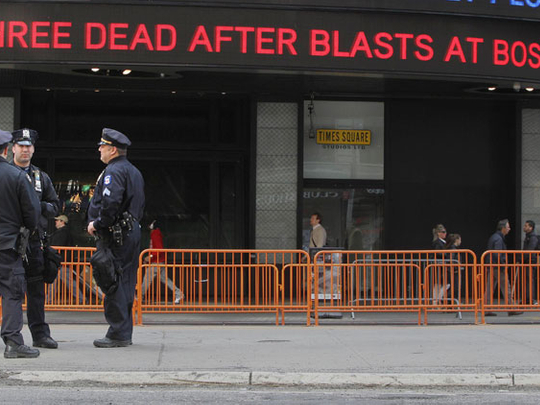
In many aspects, the Boston bombings offered a glimpse of what the business of reporting will look like in the future. It provided us, also, with some clues as to the possible change of perceptions between the Arab world and the West.
All news people can see now that media interactivity is here to stay. Reactions to the terrorist act showed us an interconnected world where social media brought together reporters, regular citizens and law-enforcement officers. The demarcation lines were blurred; and roles were in certain regards reversed.
Author and journalist John Dickerson told people what to expect in the future: “As a consumer in a breaking news environment, when there are fewer filters and you’re switching from Reddit to CNN to Twitter to the New York Times, you’re becoming an editor and not a simple passive recipient.”
Video came from a multitude of sources: TV network coverage, smartphone recordings and street surveillance cameras. It was all available to news editors, social media amateur sleuths and police investigators.
Improvement in cellphone and video technologies and the proliferation of enhanced-capacity surveillance cameras will probably transform our lives into one big reality television programme.
And the public even in countries with the strongest privacy concerns do not mind. A Rasmussen survey conducted after the Boston bombings showed that 70 per cent of Americans support the use of surveillance and security cameras in public places. So much for the brave fight of civil libertarians against ‘Big Brother’.The future belongs to legitimised voyeurism.
A kind of titillation
Competition for ratings between television networks came at times with less quality journalism. American playwright Bonnie Greer felt compelled to say: “What I saw can only be described as a kind of titillation whose essence was something resembling the news coverage.” She then asked: “Is news porn the next trend?”
Fast spinning 24-hour TV news cycles and the haphazard guesswork of social media users came with mistakes. Innocent Arab bystanders, including a Saudi and Moroccan, were misidentified as suspects.
There were also self-corrections, some less contrite than others. The social news service Reddit eventually acknowledged having contributed to ‘online witch hunts’. CNN News fumbled the ball a few times in the rush for scoops. It admitted its mistakes.
But this trend might have to be ‘adjusted’ in the future. In their just-published book The New Digital Age, Google executive chairman Eric Schmidt and Jared Cohen, director of Google Ideas, were probably right to point out that mainstream media will eventually get out of the business of “breaking news”, since “people will have little patience or use for media that cannot keep up”. The big media will “report less and validate more”.
It would not be a bad thing, if in the next crisis, the media could devote more time to putting things in context. They could, for instance, explain to news consumers who had skipped their world geography classes at high school that Chechnya is not the Czech Republic. The confusion has led some on Twitter to speculate about the risks of war erupting between the US and the unsuspecting Czechs.
In the recent Boston events there were also signs of a changed relationship between the America and the Arab world. A change for the better, I venture to say. People in the Middle East and the Muslim world almost overwhelmingly denounced the bombing. Many wondered, however, if people in the West would have been equally concerned had the casualties occurred in Afghanistan or Syria. They wondered if western media would have devoted the same level of attention if the bombings occurred in some Third World city. Probably not. The media will always devote more attention to the victims in their backyard. But for the public at large, no intensive sensitivity training course could fix the problem of insufficient empathy. That will require a continued effort at building mutual empathy and respect, in order to appreciate the equal value of human life.
The good news, however, is that there is a growing awareness of the current shortcomings. In recent days, there were many in the West who deplored the “hierarchy of death” criteria, according to which the deaths of westerners register more in the West. A few days after events in Boston, the US Congress was hearing from an Arab-Muslim witness about the impact of US drones on innocent civilians and the US reputation in the region. ‘Unprecedented’, the Washington Post observed.
Judgement
It is also important to note that there was a no propensity on the part of western media to rush to judgement after the Boston bombing. There was even widespread hope that the culprits do not prove to be Arabs or Muslims. In the Arab world, the public and the media shared that same hope.
Most Arabs had already enough domestic concerns. Saudi columnist Ala’a Hamza describes an additional trend. “We have become more sensitive towards terrorism. We have become more sympathetic to its victims than its perpetrators. There has been an incremental awareness that nothing justifies the killing of innocent civilians,” he says.
A less reassuring trend, however, is that continuing violence in the Arab world is losing its international ‘newsworthiness’. With fatigue, numbness to tragic events creeps in. It has happened before in Rwanda. Death and destruction should not let become the new normal in North Africa and the Middle East.
Oussama Romdhani is a former Tunisian minister of communication.












